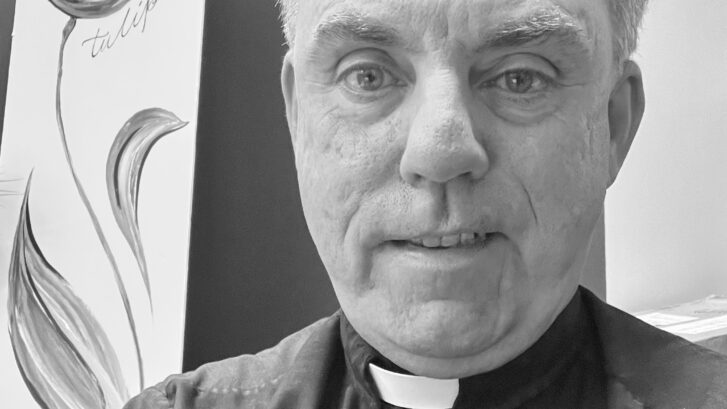Homily
I once saw a couple in what appeared to be in a cruel and hot argument, the kind to end a relationship. Then a couple of weeks passed, and I happened to see them again, but this time hand-in-hand in taking a stroll in a park. Then, one of them said something, and they both laughed, and simultaneously exclaimed: “That’s true! That’s oh so true! Then they kissed. I have to say I was pleasantly surprised to see that they were over their previous contention and anger upon one another.
The Scriptures
Psalm 85 R. “Lord, let us see your kindness, and grant us your salvation. Kindness and truth shall meet; justice and peace shall kiss. Truth shall spring out of the earth, and justice shall look down from heaven. R. Lord, let us see your kindness, and grant us your salvation. The LORD himself will give his benefits; justice walks before him.”
Mark 6: The Commissioning of the Twelve Apostles including the line “So they went off and preached repentance” (Mk. 6:7).
The Psalm for this Sunday contains familiar words: “Kindness and truth shall meet; justice and peace shall kiss. Truth shall spring out of the earth, and justice shall look down from heaven” (Ps. 85:11-12). This promise speaks of a great hope in heralding a beautiful change. We so often lament the lack of justice in our world, and criticize the inconsistencies we witness. Those wishing to be kind can gloss over or even outright ignore truth. Those who seek justice can appear to sow dissension, and peace seems to result from accepting injustice or ignoring its presence.
Of course, in such a view of justice, we ordinarily tend toward human concerns. We can identify harmful discrimination and systemic, socially-implemented manifestations of this discrimination. We can observe the carelessness people often have for God’s creation, including treatment of animals and laziness with preventing pollution. When it comes to more personal matters, we likely remember the injustices we’ve also encountered. We are surrounded by and immersed in the effects of injustice.
This Psalm today and its tone reminded me of a President that pondered over such idealic Scriptures: It was Abraham Lincoln. He read the Bible daily. He would be impacted by its prophetic dreams (like of Psalm 85) that proclaimed how “kindness and truth could meet, justice and peace kiss.” Abe looked out over America and her mid-19th century woes and he applied the moral truths and absolutes in God’s Word to our national situation.. Lincoln made statements that demanded truth and justice, with exposures of the great wrongs among us. He exhibited slavery as an enormous problem, branding it a “monstrous injustice.” He pictured the slave-masters as “wringing their bread from the sweat of other men’s faces,” adding in another speech: “If Slavery is not wrong, then nothing is wrong.” He was calling the nation to receive some blessing from Heaven, provided we bow heads in repentance for our poor deeds. Abe gave his life for this cause. The assassin John Wilkes Booth took his life by a shooting in DC’s Ford’s Theatre.
The gospel reading from Mark today contains a familiar story of the commissioning of Twelve apostles, and it includes the line “So they went off and preached repentance” (Mk. 6:7). Repentance. This is the key that redirects our concerns about justice. The human repercussions of injustice are visible, but the relationship with God, often forgotten in the equation, is the primary one suffering damage. Naming injustice as sin means recognizing our failure in a relationship with the one to whom we owe everything. In sinning, we fail to give what is due to God.
And of course, we can never perfectly give what is due to God; we can’t exercise objective justice in a relationship with the one who created, redeemed, and sustained us. And we know we will continue to fail and sin. Yet, to borrow the phrase of the biblical scholar Gary Anderson, “the system is gamed in our favor.” With repentance through Christ, we open the opportunity for God to accept our relative justice as real justice, to extend his mercy and restore the wounded relationship. This mercy is not unjust, but rather goes beyond justice: the decision to forgive a debt despite a complete payment from the debtor.
If we are serious about remedies for injustice in our world, we must be serious about repentance. We cannot adequately address systemic problems and their deleterious effects or chase after peace without naming our sins as offenses against God. The word “repentance” generally doesn’t evoke a warm, fuzzy feeling, but when we think of the system being gamed in our favor – Christ dying for our sins on the cross, God wanting so much to extend mercy in response to our confession of sins – we can’t help but take a positive view of repentance. “In him we have redemption by his blood, the forgiveness of transgressions, in accord with the riches of his grace that he lavished upon us” (Eph 1:7).
When we become dismayed with the serious injustice we find in the world today or disappointed in our own sinfulness, we should take heart in the message we hear today in our readings. God is no strict accountant with a desire to punish us. God wants so much to restore us and our relationship; even the smallest move to repentance becomes an opening for his grace and mercy. And thus, when we hear and respond to that message of repentance coming from Christ through the Apostles, we move toward the realization of the Psalm: “Kindness and truth shall meet; justice and peace shall kiss.”


